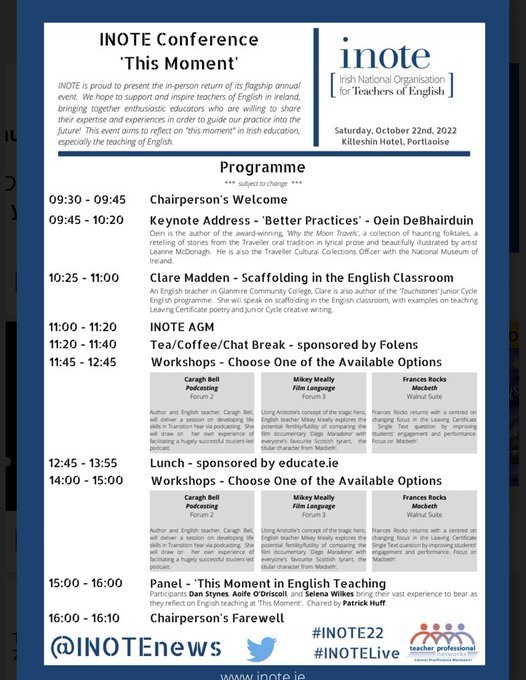INOTE 22
Saturday saw the first in-person INOTE conference for English teachers in Ireland since 2019 (when I gave the keynote and seem to have jinxed it for everyone since). I’ve attend plenty of INOTEs over the years and they always have the same spirit: friendliness, collaboration, positivity, as lots of English teachers spend a Saturday away from their families with a different kind of family. The spirit was just the same as at researchED Dublin in September, and of the much more modest English Meet in May. Handy though remote conferences were, there is nothing like being together (and attending a conference without having to speak or organise anything felt luxurious, too).
This year in Portlaoise the keynote address was given by Oein DeBhairduin, author of an excellent book I recommended two years ago, Why the Moon Travels, a collection of Traveller folktales. This was a terrific start to the event. He did what such a presenter should do: inform us, interest us, make us think (and he was funny). There is no doubt that there is little diversity in the English teaching profession here, and Oein spoke from an angle many of us have rarely considered. As a member of the Traveller community, he asked us to consider three questions:
What you do know about Travellers?
How do you know that?
How have you validated/verified it?
Travellers have always been part of the fabric of Irish society and yet they are regarded as ‘other’. In 1963 Charles Haughey, later a (disgraced) Taoiseach, unbelievably referred to a ‘final solution’ in the Commission on Itinerancy, a mere 18 years after the Nazi Final Solution was brought to an end. Words matter.
Later, Oein described his own ‘petrifying’ experience of studying John B. Keane’s The Field in English class in school, where references to his community were unaddressed and bypassed. He would have preferred the teacher to engage with the issues and fail, rather than ignore them. Teachers should give themselves permission to try and fail. We can be brave - transformative, rebellious, radical.
The next speaker, Clare Madden, brought us back to the practical processes of the classroom, showing in detail how she scaffolds support for composition writing (particularly a Fractured Fairytale story) and poetry answers, aiming to reduce cognitive load for her students. This highly practical session was much appreciated by all (Clare also spoke at researchED Dublin).
In the elective sessions I went to Frances Rocks on Macbeth, as ever very detailed and exam-focussed [more exam focus: I’ll be doing a free webinar on January 9th for Tralee Education Centre, on revising the play], and then Caragh Bell who gave an engaging account of her Transition Year podcast project, SHSS, which includes interviews with David Puttnam, Aoife Casey and Flor McCarthy.
Finally, the panel of experienced teachers was chaired by Patrick Huff. Aoife O’Driscoll, Selena Wilkes (who spoke at our English Meet) and Dan Stynes addressed: favourite books, the post-Covid return, examination assessment adjustments, classroom challenges, the Paper 1 proposal and more.
All of which added up to an excellent day. In his opening remarks, retiring Chair Conor Murphy had given a properly passionate defence of English teachers’ principles, which are being eroded by poorly constructed Junior Cycle exams and the potentially disastrous Senior Cycle reform. As he said, the latter may also damage Transition Year, all for the sake of what he calls the ‘CAO exam’. His arguments are on the record in the Editorial of the magazine handed out to delegates:
English is a transformative subject, one that impacts on every person in a different way. At its core it is about personal creativity and critical thinking… INOTE strives to retain the rigour of the subject through a CPD model aimed at teachers talking to teachers, of every teacher having a voice and every teacher being acknowledged as a professional.
Conor has been a model leader of the organisation, defending those principles in public with eloquence and determination. No doubt the new committee will build on this, starting with a meeting with the Minister to address the Senior Cycle mess. For the rest of us, there is just gratitude to all the volunteers who put together such an uplifting day.
